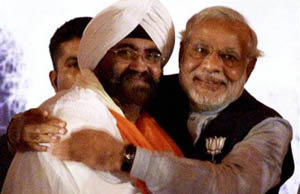 New Delhi, Apr 26: A day after Prime Minister's step-brother Daljeet Singh Kohli joined the Bharatiya Janata Party in presence of Narendra Modi in Punjab, Dr Manmohan Singh's nephew Manbir Singh on Saturday said all the family members are "shocked" with the decision.
New Delhi, Apr 26: A day after Prime Minister's step-brother Daljeet Singh Kohli joined the Bharatiya Janata Party in presence of Narendra Modi in Punjab, Dr Manmohan Singh's nephew Manbir Singh on Saturday said all the family members are "shocked" with the decision.
"All our family members are completely shocked with Daljeet's decision. It may be his personal choice that he has changed his ideology. We are completely with Dr Singh and we support Captain Amarinder Singh here in Amritsar," said Manbir.
Manbir disclosed that he too was asked to join the principle opposition party but he refused.
When asked about whether he had any clue about Daljeet's decision, Manbir reiterated that family members were shocked and only Daljeet can tell why he left the whole family and took such a big decision.
Surjit Singh Kohli, the elder brother of Daljeet Singh, said he was "shocked" at the development. "I am shocked", he told reporters.
Surjit Singh, also a local businessman, has been supporting Congress.
The entry of Kohli, a local businessman, into the BJP came a day after the prime minister rejected perceptions of a 'Modi wave' in the country. Lok Sabha elections in Punjab are due in one phase on April 30.
Kohli into the BJP fold, Modi said he will further strengthen the party.
Kohli, a businessman based here, joined the Bharatiya Janata Party (BJP) when Modi came here to address a rally in favour of senior party leader Arun Jaitley, who is contesting from the Amritsar Lok Sabha seat.
Kohli had remained apolitical even after his elder brother Manmohan Singh became prime minister in 2004 and got a second term in 2009.
Manmohan Singh had studied in Amritsar after his father's family migrated here from western Punjab in Pakistan following the partition in August 1947.






Comments
Add new comment